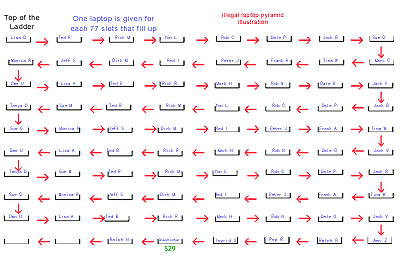

start | page two | sample signup | 400 signups
|
Here is a screen shot of the first page inside www.threepeople.com. The pyramid they run requires three positions below every name instead of just two. It doesn't pay off until seven layers are full. They charge only $5 to enter the pyramid, so they need
many, many victims to generate enough income, entrapping 729 people for
each laptop they distribute. If their three-person promotion continued for
six layers, it would look like this. |
|
There is a tendency among the uninitiated to envision the pyramid growing forever and ever, but it cannot. But! What if it did grow forever!?
|
|
If the pyramid grew every day, with each new person recruiting three people a day, the pyramid would grow one level per day for 21 days. The speed isn't important, but when the pyramid is 21 levels tall, there will be 4.6 billion people in it. It will have reached the highest level possible until the earth's population reaches 14 billion. |
 Sometimes
pyramid schemes use the name "matrix" or "straight
line matrix" (and they hardly ever use the term "scheme"). Sometimes
pyramid schemes use the name "matrix" or "straight
line matrix" (and they hardly ever use the term "scheme").A matrix is any kind of network of positions that people can buy their way into. In an attempt to avoid the tell-tale pyramid shape, spirals, boxes and straight lines are used. They also call it a ladder, a tree or an escalator. In a straight-line matrix, new recruits' names are placed at the end of the line while rewards are given at the top. For example, www.yourfreelaptop.com rewards one person at the top of their list with a laptop for every 77 new paying signups. Part of their technique is to withhold showing the entire list until you've already signed up. Only then do you see the 6,000 people on their seven-page list of names. There is a temptation to think that if you can get 77 other people enrolled, that you will get a laptop, but it doesn't work that way. That would work if you were at the top of the list, but you aren't, and you probably never will be.
|
| Getting customers to promote your product is an art form.
Sometimes programs are simple, sometimes they are complex, sometimes they
are illegal.
Examples of customers being harnessed to promote products:
The examples above are not pyramid schemes because the promotional programs are used to sell legitimate products or services. The promotions are obviously not the focus of these businesses. |
Most of the your free laptop-style pyramid scheme websites claim to be legitimate businesses, and that claim is supported by their sales of ebooks. The sites claim to be operating Multi-level Marketing companies. Here is a breakdown of the sites I know about: Threepeople.com, movemeup.com, mtsstudios.com, expo4less.com, FreeLaptops4all.com, yourfreecomputeronline and 10dlaptop.com sell ebooks, tymglobal.com sells a "Laptop Intro Package", afreelaptop.com sells a membership to something called EDonline. EZexpo.com sells a "series of reports". HRLV.com sells a web hosting package, as does CashCulture.com I am pretty sure the ebooks are worthless. Free ebooks are available in a number of places online, but it is hard to imagine wanting any book if you didn't even know the title of it. I checked ebay to see if anyone is selling them, but I didn't find much action. Members of yourfreelaptop.com that I interviewed didn't even bother opening the ebooks they bought. They joined for the laptop. The two differences between a classic pyramid scheme and a legitimate business are whether 1) they have a set of real products, and 2) the system of promotion exists to sell the product (vs.the product existing to sell the promotion). Just having a set of real products isn't enough. They've got to be the driving force behind the company. The United States Court of Appeals for the Ninth Circuit stated it well when they ruled in Webster vs. Omninutrition International. The Federal Court stated, "The mere structure of the scheme suggests that Omnitrition's focus was in promoting the program rather than selling the products... The promise of lucrative rewards for recruiting others tends to induce participants to focus on the recruitment side of the business at the expense of their retail marketing efforts, making it unlikely that meaningful opportunities for retail sales will occur." Just as Omninutrition found the "we are just like Amway" defense ineffective, Laptop pyramids will hopefully find their "we are just an MLM" defense ineffective. |

I've spent a tremendous amount of time studying the Herbalife business model, struggling to determine if it is a pyramid scheme. They have a vast set of products, but the average person is ten times as likely to encounter an ad for their "business opportunity" than for their products.
|
 Pyramid
schemes don't just affect their hapless members. Because they rely on
continuous promotion, members are tempted to use
unsolicited email, faxes and phony laptop
auctions to spread the word. Pyramid
schemes don't just affect their hapless members. Because they rely on
continuous promotion, members are tempted to use
unsolicited email, faxes and phony laptop
auctions to spread the word.I fear the "$29 laptop matrix" type of scheme is poised to become more common and better disguised. I'd like to stop this... ..on the other hand, I'm 100% in support of any beer-a-mid schemes that might pop up. Thanks. Update!Steve Manners wrote to tell me about the pyramid scheme at itsvirtuallyfree.co.uk. Not even a veneer of legitimate business here. Read their FAQ about why they don't post a phone number. Wonderful. Oh, and they are setting up shop "in the US" too: itstotallyfree.com. |
| Additional information on Pyramid schemes: |
start | page two | sample signup | 400 signups | Contact Rob
How much is inside a Keg? | Sneakycheap | Work from home overload | Free Electronics Scam on Ebay | Cockeyed Home
Last updated February 10th, 2003.